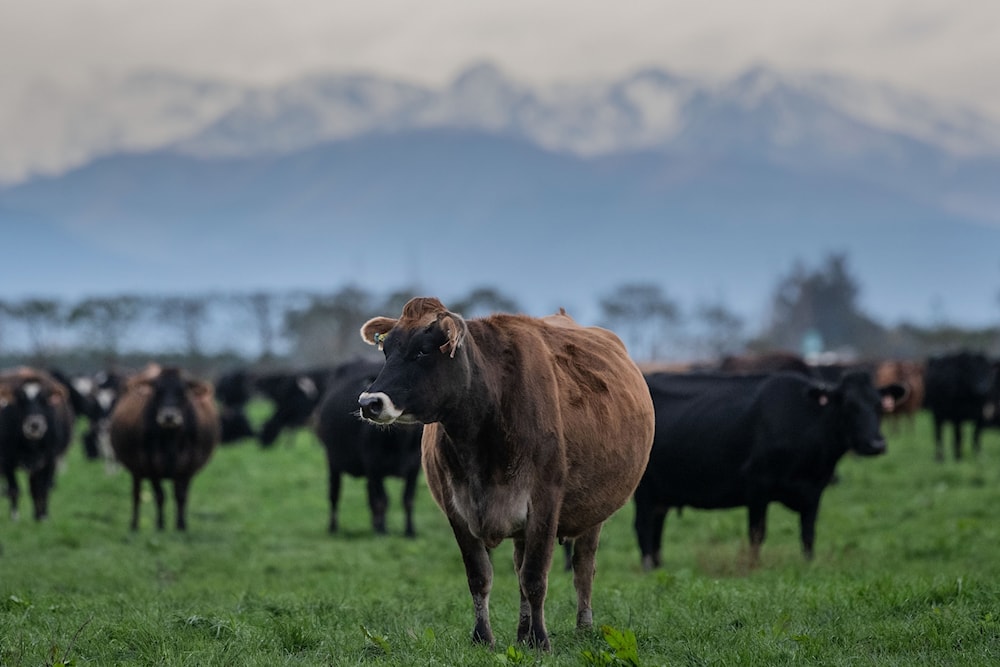UK dairy farms ignoring pollution rules as manure seeps into rivers
Newly disclosed data unmasks that a significant majority of English dairy farms, 69% out of 2,475 inspected by the Environment Agency from 2020 to 2021, were found to be violating environmental regulations.
-

Illustrative: Cattle in a field at Townshend Farm in Ashburton, New Zealand. (AFP)
A new report by The Guardian revealed that most dairy farms in the UK are failing to adhere to pollution regulations, resulting in significant quantities of cow manure being released into rivers.
The entry of animal waste into rivers leads to an accumulation of nutrients like nitrates and phosphates, triggering the growth of algal blooms, as per the report.
These blooms, in turn, deplete oxygen levels in the water and obstruct sunlight, endangering fish and other aquatic organisms by suffocating them.
Newly disclosed data, obtained through freedom of information laws, unmasked that a significant majority of English dairy farms, 69% out of 2,475 inspected by the Environment Agency from 2020 to 2021, were found to be violating environmental regulations.
The issue extends across the UK; in Wales, 80% of 83 dairy farms inspected by Natural Resources Wales between 2020 and 2022 were not adhering to anti-pollution rules. In Northern Ireland, 50% of 339 dairy farms inspected by the Department of Agriculture, Environment and Rural Affairs between 2020 and 2022 were found to be non-compliant. Meanwhile, in Scotland, 60% of the 114 dairy farms initially surveyed by the Scottish Environmental Protection Agency between 2020 and 2023 were found to be in breach of regulations.
Dive deeper
Activists have drawn parallels between the pollution dilemma stemming from dairy farms and the sewage crisis, citing common factors such as outdated infrastructure and heightened discharge intensity. They argue that supermarkets' pricing pressures, offering minimal compensation to farmers for milk, have pushed producers to boost production by expanding their cow herds.
Charles Watson, the chair of the charity River Action, said as quoted by The Guardian that “the unacceptable pollution levels caused by the UK dairy industry is not dissimilar to the current UK sewage pollution crisis: aged infrastructure, designed for much lower volumes of effluent, being overwhelmed by the combination of intensification of use and more volatile weather conditions.”
“With a herd of 50 cows calculated to be capable of emitting the equivalent amount of pollution as a human settlement of 10,000 people, it is hardly surprising that the dairy industry is placing an unsustainable pollution burden on many river catchments across the country. Meanwhile, yet another chapter in the British river pollution scandal unfolds, our impotent regulators continue to watch on in a solely advisory capacity, and the giant supermarket groups happily count their profits at the cost of the continuous degradation of the environment,” Watson added.
The report added that River Action is advocating for dairy processors to provide incentives to farmers who adopt responsible milk production practices, such as less intensive farming methods or investing in proper disposal of cow waste.
River Action also urged regulators to enhance their enforcement of current anti-pollution regulations, noting that many farms go without inspections for years due to insufficient staffing caused by underfunding. It is calling on the relevant devolved national bodies to broaden and prolong existing grant programs aimed at enhancing slurry management infrastructure.
The Department for Environment, Food and Rural Affairs said, “We have set ambitious legally binding targets to reduce water pollution from agriculture and are taking wide-ranging action to clean up our waterways. This includes investing £74m in slurry infrastructure to help farmers cut agricultural runoff and rolling out new farming schemes to thousands of farmers to deliver environmental benefits and adopt more sustainable practices – all to reduce the amount of nutrients entering rivers.”
Read next: Scale of ‘forever chemical’ pollution across UK and Europe

 4 Min Read
4 Min Read








